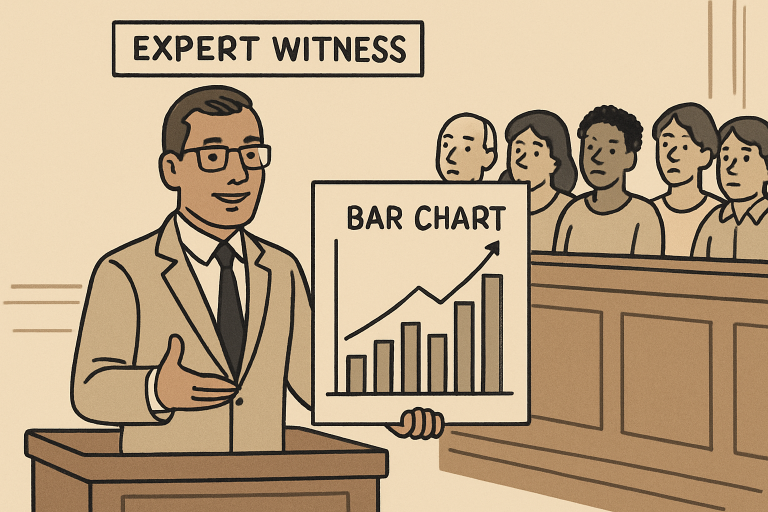How Expert Witnesses Help Simplify Complex Financial Cases for Juries
Key Takeaways
- Financial expert witnesses translate complex financial data into clear, understandable testimony for juries.
- Their credibility depends on professionalism, objectivity, and fact-based explanations rather than advocacy.
- Visual aids like charts and graphs strengthen juror comprehension and retention of financial details.
- Case studies highlight how expert witnesses have swayed outcomes in high-profile fraud and corporate trials.
- Attorneys maximize expert impact through careful vetting, preparation, and open collaboration.
- The rise of digital assets and cyber-forensics is expanding the role of expert witnesses in modern litigation.
The Role of Expert Witnesses in the Courtroom
In the courtroom, financial cases often hinge on details too technical for most jurors to grasp without guidance. This is where financial expert witnesses play a pivotal role. Financial disputes—fraud, embezzlement, or complex business valuations—require reliable explanations grounded in established methodologies. Engaging financial expert witness services bridges the gap between sophisticated financial analysis and the practical need for clear, digestible testimony. Their input helps ensure that all facts are fully understood and justly weighed, no matter how convoluted the numbers appear at first glance.
Breaking Down Financial Jargon for Lay Audiences
Juries often face immense challenges when presented with accounting concepts, forensic analysis, or detailed market data. Most jurors lack backgrounds in finance or law, so the language used in these cases can quickly become a barrier to understanding the facts. Without clear translation, crucial points might easily be misunderstood or overlooked entirely.
Expert witnesses overcome this by utilizing creative teaching methods—analogies to everyday experiences, visual aids, and step-by-step walk-throughs—to demystify technical language.
Building Credibility with Jurors
Credibility is foundational to expert witness effectiveness. Jurors are likelier to trust testimony delivered with poise, professionalism, and respect for the proceedings. Experts build rapport through a calm demeanor, thoughtfully structured explanations, and maintaining eye contact with the jury, rather than focusing solely on the attorneys or the judge.

Even more important, financial expert witnesses must present their analyses objectively, avoiding advocacy for one side. Fact-based, unbiased testimony is central to legal requirements and expert witness work’s ethical standards. This impartial approach reassures jurors that the expert’s conclusions stem from the evidence, not from personal or client interests.
Visual Aids and Demonstrative Evidence in Financial Cases
Explaining financial information is often aided by the use of visual evidence. Charts, graphs, spreadsheets, and financial models can transform reams of complicated data into digestible visuals. For example, a simple bar graph comparing expenses before and after an alleged fraud can quickly illustrate what might otherwise require hours of verbal testimony.
Visual aids are proven to enhance juror understanding and memory, especially in cases where numbers and timelines are critical.
Case Studies: When Expert Witnesses Made the Difference
History is replete with high-profile cases where expert financial testimony swayed the outcome. In notable corporate fraud trials, such as the Enron or WorldCom scandals, expert witnesses clarified accounting irregularities and helped jurors see through deliberately obfuscated transactions. Their explanations clarified the scope of financial misconduct and equipped juries with the confidence to render informed verdicts.
Obstacles and Critiques Facing Expert Witnesses
Despite their importance, financial experts also face scrutiny. Allegations of bias, potential conflicts of interest, or the perception that experts are mere “hired guns” can erode trust. Jurors may witness dueling experts with sharply contrasting opinions, further muddying the waters. Courts manage these concerns through rigorous qualification standards and pre-trial hearings like Daubert or Frye challenges, requiring evidence of the expert’s methods and impartiality.
Maintaining objectivity is paramount. Well-respected experts make conscious efforts to speak to the facts, acknowledge the limits of their knowledge, and avoid overstating their conclusions—a practice essential to preserving both their reputations and the integrity of the trial process.
Best Practices for Attorneys Working with Financial Experts
Maximizing the value of financial expert witness services requires attorneys to engage in thorough pre-trial preparation. Legal teams must vet and brief experts carefully, understand their methodologies, and ensure alignment on case strategies. Prepping for direct and cross-examination helps experts anticipate lines of questioning and present their findings clearly and concisely.
Open, ongoing communication throughout the litigation process ensures testimony remains consistent and focused. Effective collaboration between attorneys and experts is critical in simplifying financial disputes for jurors and strengthening overall case outcomes.
Expert Witnesses and the Evolution of Financial Litigation
The financial litigation landscape is rapidly changing. Emerging trends—from complex digital payment systems to the rise of cryptocurrency-based fraud—are ushering in new challenges for courts and experts alike. The U.S. Department of Justice notes the increasing prevalence of digital assets in crime, requiring forensic expertise that keeps pace with technological innovation.
As the financial world continues to digitize, the role of expert witnesses is expanding to include advanced analytics, cyber-forensic techniques, and real-time data analysis. Staying ahead of these trends is vital for legal and financial professionals to meet the needs of increasingly complex disputes.
Why Expert Testimony Is Essential for Jury Clarity
Expert witness testimony is a cornerstone for transparency and clarity in financial litigation. For both plaintiffs and defendants, having a credible expert in the witness box makes even the most arcane figures accessible and understandable, leveling the playing field for all parties. Looking forward, continued innovation in communication techniques and technological literacy will be essential for helping juries make fair, informed decisions in an ever-evolving landscape of financial disputes.